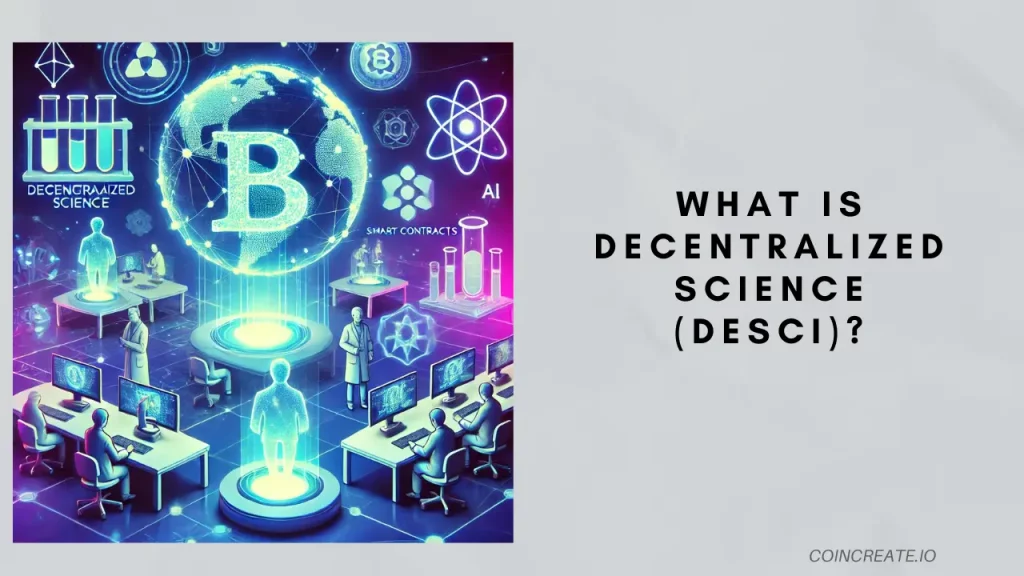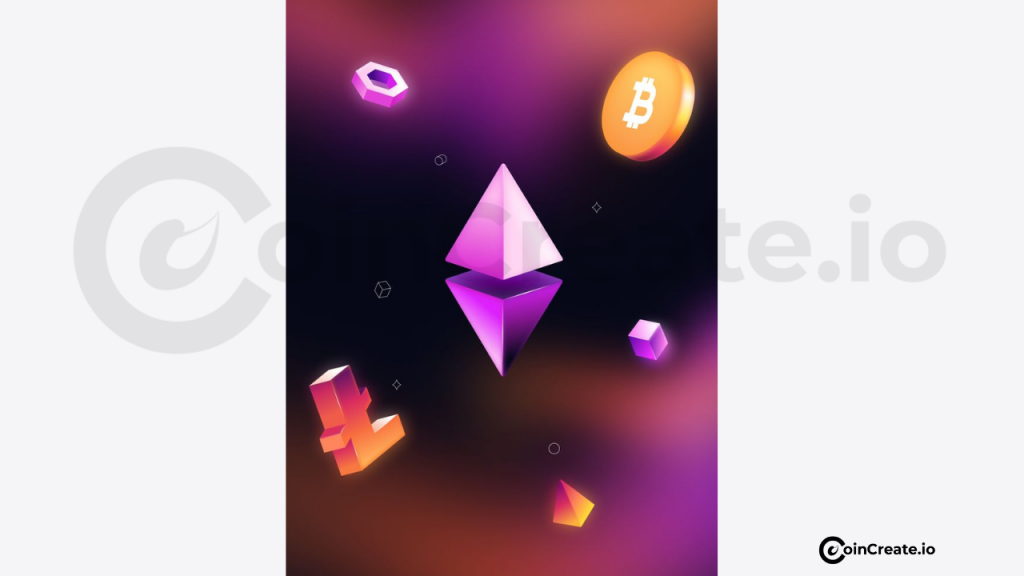What Is Decentralized Science (DeSci)?

Ever felt like the scientific world could use a shake-up? Enter Decentralized Science, or DeSci, a movement that’s not just tinkering around the edges, but fundamentally rethinking how research gets done. Imagine a scientific landscape that’s more open, transparent, and driven by the community itself. That’s the promise of DeSci, and it’s all powered by the magic of blockchain.
Why Traditional Science Needs a Change
Let’s face it, traditional science has its flaws. Here’s where DeSci steps in to offer some serious upgrades:
The Funding Funnel: Ever wonder why certain research gets the green light while other brilliant ideas languish? Traditional funding often relies on centralized institutions, which can introduce bias and limit the scope of what gets explored.
The Publishing Paywall: Groundbreaking discoveries locked behind journal paywalls? It’s a real problem! This gatekeeping slows down the spread of knowledge and hinders collaboration.
Access Denied: Data in the Shadows: Scientific progress thrives on open access to data and findings. But too often, this information is restricted by copyright or kept under lock and key, stifling innovation.
Decentralization to the Rescue
So, how does DeSci address these challenges? By flipping the script and embracing decentralization:
Blockchain: The Bedrock of Trust: Blockchain technology ensures the integrity and immutability of scientific records, eliminating the need for those pesky intermediaries.
Open-Source Research: Knowledge Without Borders: Transparency is the name of the game! By making data and findings openly accessible, DeSci promotes collaboration and accelerates discovery.
Smart Contracts: Funding on Autopilot: Forget the bureaucracy! Smart contracts enable automated and transparent funding mechanisms, like quadratic funding, which empower communities to directly support the projects they believe in.
Key Technologies and Players
Blockchain
Think of it as the secure and decentralized foundation for data storage and transactions.
Open Science
This movement champions the sharing of research data and methods, fostering collaboration and ensuring reproducibility.
Smart Contracts
The automated engines that power fair funding allocation and other critical processes.
DeSci in Action: Transforming Scientific Workflows
Let’s dig into the nuts and bolts of how DeSci actually works to revolutionize the scientific process:
The Power of Blockchain: A Secure Foundation
Blockchain technology is the backbone of DeSci. It provides a secure, transparent, and decentralized platform for storing and managing scientific data and transactions. This ensures that scientific records are tamper-proof, reliable, and easily accessible, fostering trust and collaboration among researchers.
Core Components of DeSci
DAOs: The Voice of the Community
- Decentralized Governance: DAOs empower stakeholders to participate in funding allocations and project governance without relying on centralized institutions.
- Innovative Funding: Through quadratic funding, DAOs ensure resources are allocated based on community consensus, fostering inclusivity and transparency.
Smart Contracts: Automation and Trust
- Streamlined Processes: Smart contracts automate tasks like peer review, funding distribution, and collaboration agreements, boosting efficiency and minimizing errors.
- Incentivizing Excellence: Token-based rewards for researchers promote reproducibility and incentivize high-quality contributions, creating a virtuous cycle of scientific advancement.
Decentralized Peer Review: A New Standard of Transparency
- Accountability: Blockchain-based peer review processes ensure transparency and accountability, leading to more reliable and verifiable scientific findings.
- Democratized Access: By removing traditional gatekeepers and paywalls, decentralized platforms make research more accessible, enabling a global exchange of ideas.
Decentralized Databases: Open Access for All
- Knowledge Liberation: DeSci promotes open access to scientific data by storing it on decentralized ledgers, making it freely accessible and verifiable for anyone, anywhere.
Key Players in the DeSci Revolution
DeSci Labs
These innovative platforms are focused on developing and implementing DeSci principles, often in collaboration with DAOs and cutting-edge blockchain technologies.
DAOs
The engines of governance and funding, empowering communities to shape the direction of scientific research.
Funding Mechanisms
From token-based systems to quadratic funding models, DeSci is reinventing how scientific projects get the resources they need.
Crypto and DeSci
While there isn’t a single “DeSci crypto,” blockchain-based tokens are used to incentivize research contributions and manage intellectual property rights. Tools like IP-NFTs ensure researchers are fairly rewarded and can retain ownership of their work.
Why DeSci Matters
So, what are the real advantages of embracing DeSci? Here are some of the most compelling reasons:
1. Funding Unleashed: Transparency and Accessibility
Democratized Funding Models: Blockchain-based DAOs and quadratic funding ensure transparent and community-driven funding decisions. This allows for permissionless funding, where anyone can contribute without needing centralized approval.
Rewarding Innovation: Token-based rewards incentivize high-quality work, ensuring that innovative ideas receive support regardless of their risk level.
2. Open Access: Breaking Down the Walls
Global Collaboration: By storing scientific data securely and immutably on the blockchain, DeSci makes it accessible to anyone, fostering global collaboration and the free exchange of ideas.
Diversity of Thought: DeSci platforms enable researchers from diverse backgrounds to collaborate seamlessly, breaking down institutional barriers and promoting diverse perspectives.
3. Trust and Validation: Improved Transparency and Reproducibility
Transparent Peer Review: Blockchain-based peer review processes are transparent, incentivized, and less prone to bias, ensuring that research findings are reliable and reproducible.
Rewarding Verification: DeSci rewards replication efforts, which are crucial for validating scientific results but often overlooked in traditional systems.
4. Ownership and Control: Intellectual Property Reimagined
IP-NFTs: These tokens allow researchers to retain ownership of their work while enabling decentralized revenue-sharing models, ensuring fair credit and financial benefits for creators.
DeSci in Action
DeSci is already making waves in how scientific research is funded, published, and conducted. Here’s a closer look at its impact:
Funding: A New Era of Support
Crowdfunding and DAOs: Platforms like Gitcoin Grants and decentralized autonomous organizations (DAOs) are facilitating crowdfunding for research projects, empowering communities to support impactful initiatives.
Web3 Funding Models: Innovative models like quadratic funding promote transparent and inclusive resource allocation, enabling researchers to secure funding outside traditional grant systems.
Publishing: Breaking Free from Gatekeepers
Blockchain-Based Journals: DeSci introduces decentralized publishing platforms that use blockchain to ensure the integrity and accessibility of scientific data, reducing costs and increasing transparency.
Open-Access Science: By championing open-access principles, DeSci makes scientific findings freely available, breaking down barriers to knowledge dissemination and promoting global collaboration.
Collaboration: Working Together, Globally
DAO-Driven Peer Review: Blockchain-based peer review systems are transparent, incentivized, and community-driven, enhancing the credibility of scientific publications.
Decentralized Data Sharing: Platforms like ResearchHub facilitate secure and transparent data sharing among researchers, enabling seamless collaboration and accelerating innovation.
Core Technologies Enabling DeSci
DeSci relies on several key technological components to create a more open, transparent, and collaborative scientific ecosystem. These technologies are crucial for addressing the inefficiencies in traditional scientific research and include:
Key Technological Components
Blockchain Technology: The Foundation of Trust
Immutable Data Storage: Blockchain ensures that research data is stored securely and immutably, preventing manipulation and ensuring data integrity.
Smart Contracts: These self-executing contracts automate processes like funding distribution, peer review, and collaboration agreements, reducing manual errors and enhancing transparency.
Decentralized Storage Solutions: Secure and Accessible DataIPFS (InterPlanetary File System): Allows researchers to store large datasets across a network of nodes, ensuring security and immutability through cryptographic hashing.
Arweave: Provides a decentralized data storage solution that ensures data permanence and accessibility, ideal for long-term preservation of scientific records.
Cryptographic Security: Protecting Data Privacy
Encryption and Hashing: These technologies protect data privacy and ensure that all transactions and interactions within DeSci platforms are secure and verifiable.
Decentralized Autonomous Organizations (DAOs): Community-Driven Governance
Community Governance: DAOs enable community-driven decision-making for research funding and governance, making the process more democratic and inclusive.
Tokenization and Incentives: Rewarding Contributions
Token-Based Rewards: Researchers are incentivized with tokens for contributing to research, peer review, and data sharing, promoting high-quality contributions.
DeSci Coins and Crypto Projects
DeSci leverages blockchain technology to transform scientific research by introducing blockchain-native funding models and token-based rewards. Here’s an overview of how tokens incentivize research and some notable DeSci crypto projects:
Tokenization of Research
Incentivizing Research: Tokens are used to incentivize researchers to contribute high-quality work, ensuring that innovative ideas receive support and recognition.
Token-Based Rewards: Researchers can earn tokens for participating in peer review, contributing data, or advancing research projects, creating a more inclusive and rewarding ecosystem.
Notable DeSci Crypto Projects
VitaDAO:
Focus: Longevity and health-span research.
Features: Uses DAO governance, NFTs for intellectual property management, and token-based participation in decision-making processes.
Molecule:
Focus: Democratizing access to scientific knowledge and funding.
Features: Utilizes blockchain to create a decentralized marketplace for scientific research and intellectual property.
OriginTrail:
Focus: Decentralized data sharing and management.
Features: Offers a blockchain-based platform for secure and transparent data management, with significant market capitalization growth.
Antidote DAO:
Focus: Cancer research funding.
Features: Employs blockchain for secure, transparent funding and uses tokens for community-driven decision-making.
GenomeFi:
Focus: Genomic data management and research.
Features: Utilizes blockchain for secure data storage and sharing, promoting collaboration in genomics research.
DeSci Coins
DeSci coins, such as those issued by OriginTrail (TRAC), Rifampicin (RIF), and Urolithin A (URO), are gaining traction in the crypto market. These coins support decentralized funding models, data sharing, and collaboration in scientific research, driving innovation and transparency in the field.
The Future of DeSci
So, what does the future hold for DeSci? It’s a landscape filled with both exciting opportunities and potential hurdles:
Trends and Opportunities
Increased Adoption and Growth:
2025 Outlook: Reports suggest that DeSci will experience substantial growth by 2025, driven by practical applications and a shift towards decentralized funding models.
Web3 Integration: The integration of DeSci with Web3 technologies will enhance transparency, accessibility, and global collaboration in scientific research.
Diversification of Projects:
Use Cases: DeSci is expanding beyond funding to include health data management, open-source research, and decentralized publishing, showcasing its versatility.
Tokenization and Crypto Projects: Tokens like Rifampicin and Urolithin A are gaining traction, demonstrating the potential of DeSci-specific cryptocurrencies.
Technological Advancements:
Blockchain and AI Integration: The combination of blockchain with AI solutions is expected to enhance data analysis and accelerate scientific breakthroughs.
Decentralized Data Sharing: Platforms like IPFS and Arweave are revolutionizing data storage and sharing, ensuring open access and immutability.
Challenges Ahead: Navigating the Obstacles
Regulatory Uncertainty:
Token and Cryptoasset Regulations: The lack of clear regulations surrounding the use of tokens in scientific research poses a significant challenge for DeSci’s growth.
Scalability and User Experience:
Adoption Barriers: Improving scalability and user experience will be crucial for widespread adoption among researchers and institutions.
Resistance from Traditional Institutions:
Institutional Acceptance: Overcoming resistance from traditional academic and funding institutions will require continued innovation and demonstration of DeSci’s benefits.
Future Directions: Shaping the Scientific Ecosystem
As DeSci continues to evolve, it is likely to play a pivotal role in transforming the scientific ecosystem by:
Enhancing Transparency and Collaboration: DeSci will continue to promote open access to scientific data and findings, fostering global collaboration and reducing reliance on gatekeeping institutions.
Addressing Funding Gaps: DAOs and decentralized funding models will help bridge the “Valley of Death” in scientific innovation by providing more accessible and transparent funding mechanisms.
Integrating Emerging Technologies: The integration of AI, blockchain, and other Web3 technologies will further accelerate scientific progress and innovation in DeSci.

